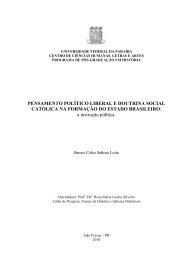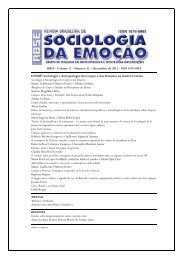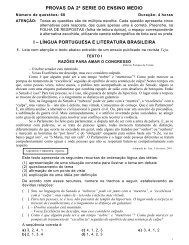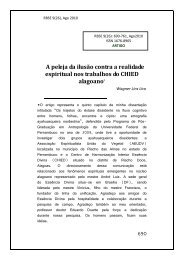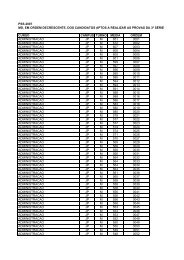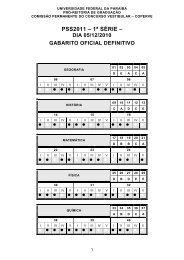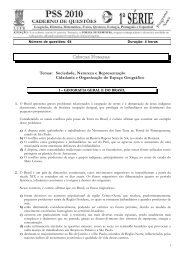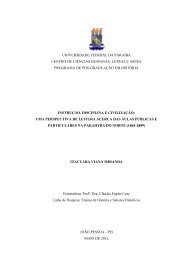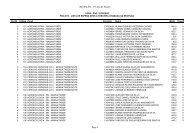abril de 2004 - CCHLA - Universidade Federal da ParaÃba
abril de 2004 - CCHLA - Universidade Federal da ParaÃba
abril de 2004 - CCHLA - Universidade Federal da ParaÃba
You also want an ePaper? Increase the reach of your titles
YUMPU automatically turns print PDFs into web optimized ePapers that Google loves.
Generated by Foxit PDF Creator © Foxit Softwarehttp://www.foxitsoftware.com For evaluation only.SCHEFF, Thomas J. Routines in humanscience: the case of emotion words. RBSE,v.3, n.7, pp.111-128, João Pessoa, GREM,Abril <strong>de</strong> <strong>2004</strong>.ARTIGOSISSN1676-8965Routines in human science: the case ofemotion words.Thomas J. ScheffRESUMOEste artigo parte do princípioque as ciências humanas caíram emrotina, mostrando como palavrasvernáculas são usa<strong>da</strong>s na pesquisasistemática, em lugar <strong>de</strong> conceitosbem <strong>de</strong>finidos. Uma revisão <strong>da</strong>amplitu<strong>de</strong> do significado <strong>de</strong> amor noidioma inglês, e o estreitamento dosignificado <strong>de</strong> vergonha sugerem queo estudo <strong>de</strong>stas emoções se encontrapreso em suposições cultural não <strong>de</strong>todo pon<strong>de</strong>ra<strong>da</strong>s. O que po<strong>de</strong> ser omelhor exemplo <strong>de</strong>ste ardil é o vastocampo <strong>de</strong> pesquisa sobre auto-estima,tendo-se em conta que a auto-estimanão foi <strong>de</strong>fini<strong>da</strong> conceitualmente. Àparte joga<strong>da</strong> pelas noções <strong>de</strong> orgulhoe vergonha, no uso vernáculo, comocomponentes <strong>da</strong> auto-estima seencontra, quase sempre, oculta econfusa. A falta <strong>de</strong> progresso nestecampo sugere que este tipo <strong>de</strong>a<strong>de</strong>rências nas rotinas científicas, nãoimporta o quão escrupuloso se seja,não aju<strong>da</strong> a resolver os problemasconceituais. Por isto, as ciênciashumanas po<strong>de</strong>m precisar entrar emum processo <strong>de</strong> <strong>de</strong>srotinização. Nesteprocesso, a busca <strong>de</strong> conceitualizaçãotomaria precedência sobre a teoria, ométodo, e as rotinas <strong>de</strong> <strong>da</strong>dos, e seorientaria em direção a uma maiorintegração entre as disciplinas,subdisciplinas, e os níveis <strong>de</strong> análiserotineiramente separados.Palavras-chave: Rotina nas CiênciasHumanas; Conceitualização;Sociologia <strong>da</strong> EmoçãoABSTRACTThis paper proposes thathuman science has fallen into routine,by showing how vernacular words,rather than well-<strong>de</strong>fined concepts, areused in systematic research. A reviewof the breadth of the meaning of lovein the English language, and thenarrowness of the meaning of shame,suggests that studies of theseemotions are trapped in unexaminedcultural assumptions. What may bethe best example of entrapment is thevast field of self-esteem research,because self-esteem has not been<strong>de</strong>fined conceptually. In vernacularusage, the part played by pri<strong>de</strong> andshame as components of self-esteemis hid<strong>de</strong>n and confusing. The lack ofprogress in this field suggests thatadherence to scientific routines, nomatter how scrupulous, cannot solveconceptual problems. For this reason,human science may need to <strong>de</strong>routinize.Conceptualization wouldtake prece<strong>de</strong>nce over theory, method,and <strong>da</strong>ta routines, and move towardmore integration between theroutinely separated disciplines, subdisciplines,and levels of analysis.Keywords: Scientific Routines inHuman Science; Sociology of Emotion;Conceptualization111



